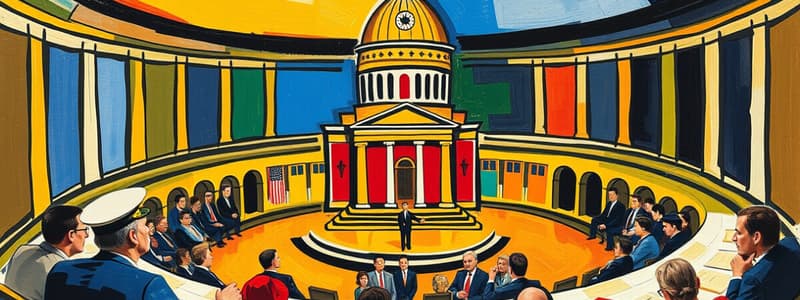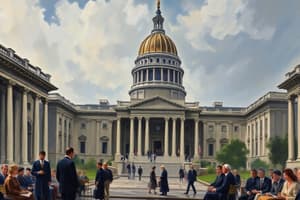Podcast
Questions and Answers
What is it called when Congress declares a person to be guilty of a crime without having been given a trial?
What is it called when Congress declares a person to be guilty of a crime without having been given a trial?
a bill of attainder
Which of these steps is second in the lawmaking process?
Which of these steps is second in the lawmaking process?
- The bill is introduced in one house.
- The bill is reviewed in committee.
- The bill is sent to the President.
- The bill passes in both houses. (correct)
What can happen if the president chooses to veto a law that has been approved?
What can happen if the president chooses to veto a law that has been approved?
The president's decision can be overridden by a majority of Congress.
What financial power does Congress have?
What financial power does Congress have?
Which of these actions is forbidden by the Constitution?
Which of these actions is forbidden by the Constitution?
What is an accurate statement about Congress?
What is an accurate statement about Congress?
What type of powers does the Necessary and Proper Clause grant to Congress?
What type of powers does the Necessary and Proper Clause grant to Congress?
What is an accurate statement about the Necessary and Proper Clause?
What is an accurate statement about the Necessary and Proper Clause?
After a bill has been introduced, what happens next in the lawmaking process?
After a bill has been introduced, what happens next in the lawmaking process?
Flashcards are hidden until you start studying
Study Notes
Congress Fundamentals
- Bill of Attainder: A legislative act that declares a person guilty of a crime without providing a trial.
- Lawmaking Process: The second step involves the bill passing through both houses of Congress.
- Presidential Veto: If the president vetoes a law, Congress can override the veto with a majority vote.
Congressional Powers
- Expressed Financial Powers: Congress has the authority to create and collect taxes.
- Forbidden Actions: The Constitution prohibits enacting ex post facto laws, which change the legal consequences of actions that occurred before the law was enacted.
Structure and Authority
- Bicameral Legislature: Congress consists of two houses, the Senate and the House of Representatives, as established by the Constitution.
- Necessary and Proper Clause: Located in Article 1, Section 8, this clause provides the basis for implied powers of Congress, granting it additional authority beyond expressly written powers.
Lawmaking Procedures
- Post-Introduction of a Bill: Following its introduction, a bill is sent to a committee for review and evaluation.
Studying That Suits You
Use AI to generate personalized quizzes and flashcards to suit your learning preferences.




